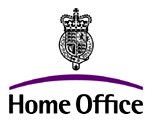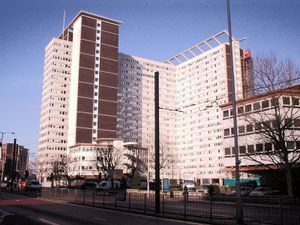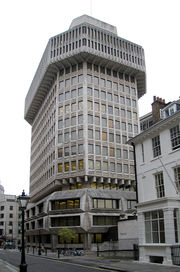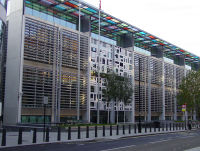Home Office
| Home Office | |
|---|---|
 |
|
| Department overview | |
| Formed | 1782 |
| Headquarters | Home Office Marsham Street London SW1P 4DF |
| Annual budget | £9.6 billion (2007/8) |
| Minister responsible | Theresa May, Secretary of State for the Home Department |
| Child agencies | Identity and Passport Service UK Border Agency Criminal Records Bureau |
| Website | |
| www.homeoffice.gov.uk | |
| United Kingdom |
.svg.png) This article is part of the series: |
|
|
Judiciary
Elections
Foreign policy
|
|
Other countries · Atlas |
The Home Office is the United Kingdom government department responsible for immigration control, security and order. As such it is responsible for the police, United Kingdom Borders Agency and MI5. It is also in charge of government policy on security-related issues such as drugs, counter-terrorism and ID cards. It was formerly responsible for the Prison Service and Probation Service, but these are now under a newly created Ministry of Justice.
It continues to be known, especially in official papers and when referred to in Parliament, by its former title, the Home Department.[1]
Contents |
Organisation
The Home Office is currently undergoing a major reform programme, following well-publicised issues in early 2006. This is the current organisation of the Home Office, but is likely to change. It is also immensely complex as there are many sub-groups within the Home Office, such as the UK Border Agency, who look after inward migration and asylum applications to the United Kingdom. The Home Office is also responsible for the Counter-Terrorism and Intelligence Directorate and the Office for Security and Counter-Terrorism, which manage the UK's response to terrorist incidents through the emergency and security services, and develops legislation relating to terrorism.
On 28 March 2007 it was announced that the Department for Constitutional Affairs would take control of probation, prisons and prevention of re-offending in England and Wales from the Home Office and be renamed the Ministry of Justice.[2] This took effect on 9 May 2007.
| Law enforcement in the United Kingdom |
|---|
| Crime in the UK · Terrorism in the UK |
| Topics |
| Agencies (defunct) · Firearms use · History · Ranks · Table of police forces |
| Equipment |
| Aviation · Firearms list · Uniform and equipment · Vehicles |
| Types of agency |
| Territorial police forces · Special police forces · Port police · Park police (London) · Service police · Non-police · Other |
| Types of agent |
| Accredited Person · Bailiff · Civil enforcement officer · Special Constable · Constable · Court security officer · Customs officer · Traffic officer · Immigration officer · Police Community Support Officer · Police Custody and Security Officer · Tipstaff · Traffic warden · Water bailiff · Wildlife inspector |
| Concepts |
| Chief police officer · Emergency Control Centre · Home Office · Neighbourhood Policing Teams · Police area · Police Authority · Police Cadets · Police Federation of England and Wales · Scottish Police Federation · Police Information Point · Police Oath · Police powers in: England and Wales - Scotland - Northern Ireland · Police Support Volunteer · Scotland Yard · Single Non-Emergency Number · Warrant Card |
| Acts |
| Police Act 1964 · Police (Scotland) Act 1967 · Police and Criminal Evidence Act 1984 · Police Act 1996 · Police Reform Act 2002 · Serious Organised Crime and Police Act 2005 · |
| Law · Courts · Prisons |
Objectives
The Home Office has the following stated objectives:[3]
- To reduce crime
- To ensure people feel safer in their homes and daily lives, particularly through more visible, responsive and accountable policing
- To protect the UK from terrorist attacks
- To re-balance the criminal justice system in favour of the law-abiding majority and victims
- To manage offenders in order to protect the public and reduce re-offending
- To secure the borders of the United Kingdom, prevent abuse of immigration laws and manage migration to the benefit of the UK.
Ministers
- Home Secretary: Theresa May
- Minister of State for Security and Counter Terrorism: Pauline Neville-Jones, Baroness Neville-Jones
- Minister of State for Police Reform: Nick Herbert (Joint with Justice)
- Minister of State for Borders and Immigration: Damian Green
- Parliamentary Under-Secretary of State and Minister for Equality: Lynne Featherstone
- Parliamentary Under-Secretary of State for Crime Prevention James Brokenshire
History


On 27 March 1782, the Home Office was formed by renaming the existing Southern Department, with all existing staff transferring. On the same day, the Northern Department was renamed the Foreign Office.
To match the new names, there was a transferring of responsibilities between the two Departments of State. All domestic responsibilities were moved to the Home Office, and all foreign matters became the concern of the Foreign Office.
Most subsequently created domestic departments (excluding, for instance, those dealing with education) have been formed by splitting responsibilities away from the Home Office.
The initial responsibilities were:
- answering petitions and addresses sent to the King
- advising the King on
- royal grants
- warrants and commissions
- the exercise of Royal Prerogative
- issuing instructions on behalf of the King to officers of the Crown, Lords Lieutenant and magistrates, mainly concerning law and order
- operation of the secret service within the UK
- protecting the public
- safeguarding the rights and liberties of individuals
Responsibilities were subsequently changed over the years that followed:[4]
- 1793 added: regulation of aliens
- 1794 removed: control of military forces (to Secretary of State for War)
- 1801 removed: colonial business (to Secretary of State for War and the Colonies)
- 1804 removed: Barbary State consuls (to Secretary of State for War and the Colonies)
- 1823 added: prisons
- 1829 added: police services
- 1836 added: registration of births, deaths and marriages in England and Wales
- 1844 added: naturalisation
- 1845 added: registration of Friendly Societies
- 1855 removed: yeomanries and militias (to War Office)
- 1858 added: local boards of health
- 1871 removed: local boards of health (to Local Government Board)
- 1871 removed: registration of births, deaths and marriages (to Local Government Board)
- 1872 removed: highways and turnpikes (to Local Government Board)
- 1875 added: control of explosives
- 1875 removed: registration of Friendly Societies (to Treasury)
- 1885 removed: Scotland (to Secretary for Scotland)
- 1886 removed: fishing (to Board of Trade)
- 1889 removed: Land Commissioners (to Board of Agriculture)
- 1900 removed: matters relating to burial grounds (to Local Government Board)
- 1905 removed: public housing (to Local Government Board)
- 1914 added: dangerous drugs
- 1919 removed: aircraft and air traffic (to Air Ministry)
- 1919 removed: use of human bodies in medical training (to Ministry of Health)
- 1919 removed: infant and child care (to Ministry of Health)
- 1919 removed: lunacy and mental health (to Ministry of Health)
- 1919 removed: health and safety (to Ministry of Health)
- 1920 added: firearms
- 1920 removed: Representation of Britain abroad in labour matters (to Ministry of Labour)
- 1920 removed: mining (to Mines Department)
- 1921 added: elections (from the Ministry of Health)
- 1922 removed: relations with Irish Free State (to Colonial Office)
- 1923 removed: Order of the British Empire (to Treasury)
- 1925 removed: registration of trade unions (to Ministry of Labour)
- 1931 removed: county councils (to Ministry of Health)
- 1933 added: poisons
- 1934 removed: metropolitan boroughs (to Ministry of Health)
- 1937 removed: road accident returns (to Ministry of Transport)
- 1938 added: fire services
- 1938 removed: Imperial Service Order and medal (to Treasury)
- 1940 removed: factory inspections (to Ministry of Labour)
- 1945 removed: workmen's compensation scheme (to Ministry of National Insurance)
- 1947 added: infant and child care (from Ministry of Health)
- 1947 removed: regulation of advertisements (to Ministry of Town and Country Planning)
- 1947 removed: burial fees (to Ministry of Health)
- 1947 removed: registration of Building Societies (to Treasury)
- 1948 removed: Broadmoor hospital (to Lunacy Board of Control)
- 1950 removed: structural precautions for civil defence (to Ministry of Works)
- 1950 removed: minor judicial appointments (to Lord Chancellor)
- 1953 removed: slaughterhouses (to Ministry of Housing and Local Government)
- 1954 removed: markets (to Ministry of Housing and Local Government)
- 1956 removed: railway accidents (to Ministry of Transport and Civil Aviation)
- 1969 removed: reservoirs (to Ministry of Housing and Local Government)
- 1971 removed: child care in England (to Department of Health and Social Security)
- 1971 removed: child care in Wales (to Welsh Office)
- 1972 removed: Northern Ireland (to Northern Ireland Office)
- 1973 removed: adoption (to Department of Health and Social Security)
- 1992 removed: broadcasting and sport (to the new Department of National Heritage - later the Department for Culture, Media and Sport)
- 2007 removed: criminal justice, prisons & probation and legal affairs (to new Ministry of Justice)
- 2007 added: counter-terrorism strategy (from the Cabinet Office)
The Home Office retains a variety of functions that have not found a home elsewhere, and sit oddly with the main law-and-order focus of the department, such as regulation of British Summer Time.
Permanent Under Secretaries of State of the Home Office
- Sir David Normington 2006–
- Sir John Gieve 2002–2006
- Sir David Omand 1997–2002
- Sir Richard Wilson 1994–1997
- Sir Clive Whitmore 1988–1994
- Sir Brian Cubbon 1979–1988
- Sir Robert Armstong 1977–1979
- Sir Arthur Peterson 1972–1977
- Sir Philip Allen 1966–1972
- Sir Charles Cunningham 1957–1966
- Sir Frank Newsam 1948–1957
- Sir Alexander Maxwell 1938–1948
- Sir Russell Scott 1932–1938
- Sir John Anderson 1922–1932
- Sir Edward Troup 1908–1922
- Sir Mackenzie Dalzell Chalmers 1903–1908
- Sir Kenelm Digby 1895–1903
- Sir Godfrey Lushington 1885-1895
Departmental agencies
- Criminal Records Bureau headed by the Minister of State (Criminal Justice and Offender Management)
- Forensic Science Service headed by the Minister of State (Crime, Security and Communities)
- Identity and Passport Service headed by the Minister of State (Immigration and Citizenship)
- UK Border Agency
Location

From 1978 to 2004, the Home Office was located at 50 Queen Anne's Gate, a Brutalist office block in Westminster designed by Sir Basil Spence, close to St. James's Park tube station. Many functions, however, were devolved to offices in other parts of London and the country, notably the headquarters of the Immigration and Nationality Directorate in Croydon.
In Spring 2005, the Home Office moved to a new main office designed by Sir Terry Farrell at 2 Marsham Street, Westminster, SW1P 4DF, on the site of the demolished Marsham Towers building of the Department of the Environment.[5] The contract to build the new headquarters was a public-private partnership deal intended to last for around 29 years.
Research
To meet the UK's 5-year science and technology strategy,[6] the Home Office sponsors research in police sciences including:
- Raman Spectroscopy – to provide more sensitive drugs and explosives detectors (e.g. roadside drug detection)
- Biometrics – including face and voice recognition
- DNA – identifying offender characteristics from DNA
- Terahertz imaging methods and technologies – e.g. image analysis and new cameras, to detect crime, enhance images and support anti-terrorism
- Chemistry – new techniques to recover latent fingerprints
- Cell type analysis – to determine the origin of cells (e.g. hair, skin)
- Improved Profiling – of illicit drugs to help identify their source
Devolution
Most front-line law and order policy areas, such as policing, are devolved in Scotland and Northern Ireland but the following reserved and excepted matters are handled by Westminster.
Scotland [7]
Reserved matters:
- immigration and nationality
- national security and counter-terrorism
- drug abuse
- emergency powers
- extradition
- firearms
- scientific procedures on live animals
The Scottish Government Justice and Communities Directorates are responsible for policing and community safety policy.
Northern Ireland [8]
Excepted matters:
- immigration and nationality
- national security
- extradition (as an international relations matter)
The following matters were not transferred at the devolution of policing and justice on 12 April 2010 and remain reserved: [9]
- drug classification
- the Serious Organised Crime Agency
- security of explosives
- parades
The Home Office's main counterparts in Northern Ireland are:
- Department of Justice (policing, public order and community safety)
- Northern Ireland Office (national security in Northern Ireland) [10]
The Department of Justice is accountable to the Northern Ireland Executive whereas the Northern Ireland Office is a UK Government department.
Wales
Under the Welsh devolution settlement, specific policy areas are transferred to the National Assembly for Wales rather than reserved to Westminster.
See also
- Home Office Large Major Enquiry System
- John Gieve
- Ministry of Home Security
- United Kingdom budget
References
- ↑ Department of the Official Report (Hansard), House of Commons, Westminster (2008-06-09). "Hansard - Oral Questions to the Home Department - 9 June 2008". Publications.parliament.uk. http://www.publications.parliament.uk/pa/cm200708/cmhansrd/cm080609/debtext/80609-0001.htm#0806094000006. Retrieved 2010-06-19.
- ↑ Home Office Split BBC News Online
- ↑ Home Office aims
- ↑ "Changes to Home Office responsibilities". Casbah.ac.uk. http://www.casbah.ac.uk/cats/archive/138/PROA00008.htm. Retrieved 2010-06-19.
- ↑ New Home Office building
- ↑ http://www.homeoffice.gov.uk/documents/PoliceST_S2_part11.pdf?view=Binary
- ↑ "Scotland Act 1998, Schedule 5, Part I". Opsi.gov.uk. http://www.opsi.gov.uk/acts/acts1998/ukpga_19980046_en_14#sch5-pt1. Retrieved 2010-06-19.
- ↑ "Northern Ireland Act 1998, Schedule 2". Opsi.gov.uk. 1950-11-04. http://www.opsi.gov.uk/acts/acts1998/ukpga_19980047_en_11#sch2. Retrieved 2010-06-19.
- ↑ Northern Ireland Assembly Information Office. "''Policing and Justice'' motion, Northern ireland Assembly, 12 April 2010". Niassembly.gov.uk. http://www.niassembly.gov.uk/record/reports2009/100309.htm#4. Retrieved 2010-06-19.
- ↑ "About the NIO". Nio.gov.uk. 2010-04-12. http://www.nio.gov.uk/index/about-the-nio.htm. Retrieved 2010-06-19.
External links
- Home Office—main website
- Records created or inherited by the Home Office, Ministry of Home Security, and related bodies—gives a history of responsibilities of the Home Office, including which functions were merged into or transferred away from the Home Office
- Home Office Watch - list of Home Office mistakes and errors
|
|||||||||||||||||
|
||||||||||
.svg.png)